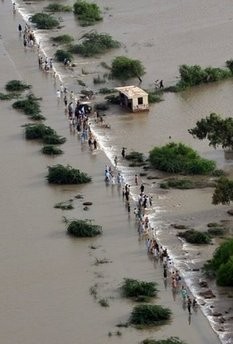A torrent of water threatening to deluge a major town in flood-hit Pakistan has begun to recede, officials said Monday, as emergency workers plugged a breach in defences against the swollen Indus river.
Pakistani troops and workers have been on a "war footing" over the weekend, battling to save the southern city of Thatta after most of the 300,000-strong population fled the advancing barrage.
"The breach near Thatta has been half-plugged and fortunately the flood has also changed its course and is moving away from the city and populated areas," senior city official Hadi Bakhsh Kalhoro told AFP.
"The water is flowing into the sea and its level is receding, and many people are returning to their homes," he said.

Pakistan Meteorological Department said inflows at the nearby Kotri barrage were receding but maintained its "significant" flood forecast.
The Flood Forecasting Centre said the Indus river at Kotri would "continue in exceptionally high flood level" for another 24 hours.
Torrential monsoon rain has triggered massive floods that have moved steadily from north to south over the past month, engulfing a fifth of the volatile country and affecting 17 million of its 167 million people.
Southern Sindh is the worst-affected province, with 19 of its 23 districts ravaged as floodwaters swell the raging Indus river to 40 times its usual volume.
One million people have been displaced over the past few days and hundreds of thousands fled Thatta alone ahead of the approaching torrents.
Kalhoro said the low-lying town of Sujawal, near Thatta, was flooded on Sunday, and almost the entire population of about 100,000 had evacuated, with power supplies cut and many residents waiting on the roofs of their homes for rescue boats.
"We estimate that there are still up to 400 people in Sujawal and the surrounding villages and they are being rescued by boats," the city official said.
The Pakistani government has been overwhelmed by the magnitude of the disaster, the worst in the country's history, with millions in need of tents, food and medical aid.
Aid agencies are worried about the growing danger of malnutrition and water-borne disease, with children especially vulnerable.
Eight million people have been left dependent on aid for their survival and floods have washed away huge swathes of the rich farmland on which the country's struggling economy depends.
The government has confirmed 1,600 people dead and 2,366 injured but officials warn that millions are at risk from food shortages and disease.
The United Nations has warned that 800,000 people in desperate need of aid have been cut off by the deluge across the country and appealed for more helicopters to deliver supplies to those reachable only by air.
A senior US official said last week that countries worldwide had pledged a total of more than 700 million dollars (554 million euros) towards flood relief in Pakistan.
























